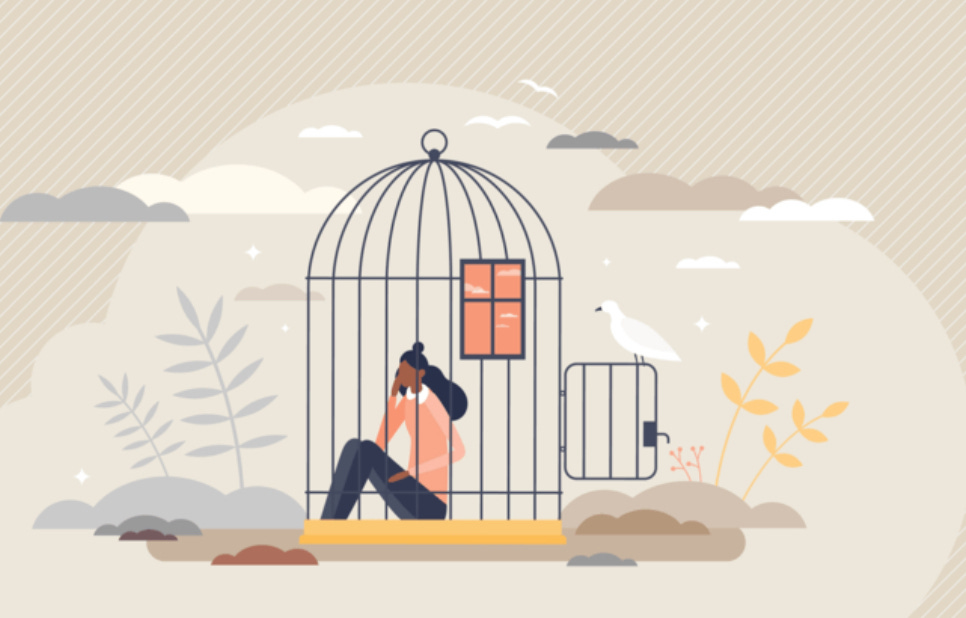The young people are keeping my brain and faith alive and vibrant! I will not take credit for the title of this post. It came out of a conversation I had with a bright young man earlier today. He is a devoted Christian but has a lot of questions, and very good questions at that - the kind of questions we older folks should have been asking all along. One encouraging thing is that we did raise the kids to think well.
What is learned helplessness? It is when we do not trust ourselves, our judgment, our spirituality or our relationship with God to guide us. We are abnormally dependent on outside influences, needing guidance and “advice” before doing anything. We become paralysed without someone telling us what to do and how to live. It is an unhealthy pattern of dependency, a subservient attitude that keeps us enslaved to external factors. The distortion of “discipling” led to generations of church members in high-control groups being unable to think for themselves. And if they do try to think for themselves, they are labeled “divisive”, “weak spiritually”, etc. Very cultish, if you ask me.
Learned helplessness destroys our inner confidence. We do not believe in ourselves. We often make derogatory comments about ourselves. In discipleship groups, we are encouraged to demean ourselves, and to constantly share about our weaknesses and the things we have to change. If we show any kind of inner confidence, we are quickly called “prideful” or “self-righteous”.
Many of us grew up in families where we were told the same things, where encouragement was seen as “spoiling”, and we became easy preys to this kind of toxic environment. Fortunately, my dad always told I was smart, capable, and I could achieve whatever I set my mind to. So I had that foundation. The constant criticism did not have much hold on me.
One telling anecdote: when Kip McKean, who at the time was the leader of our denomination, met me for the first time, he told my church leader he was not impressed with me. I guess I did not fawn enough. I also was not the bubbly, happy-clappy type. Many people sadly would have been crushed by that kind of comment. It would have resonated. I just dismissed it as erroneous and ignored it, since he did not know me. How could he judge me in a one-minute interaction? Looking back, I am glad I did not impress him. It protected me. And his comment did not impress me.
One shocking thing is that many wise, older people fell for this learned helplessness. Pastors with decades of experience fell for it. Highly educated people fell for it. And it crossed cultural lines as well. I almost fell for it. Looking back now, the resistance I exercised was actually the Holy Spirit and my instinct telling me this dependence on constant advice was garbage. It was control, plain and simple. I went along with way too much of course, but I always questioned and therefore was seen as “difficult”. I am so glad though. Interestingly, it preserved my faith. And that is one reason I am still here today, with my faith intact but my boundaries protected and my voice not silenced.
So, next time you are tempted to run to someone for “advice” before making a decision, think. Is this something I actually need advice about? Advice is good, and often needed, but have we used our brain and our judgment first? Many decisions do not require advice. And we are a lot more capable than we think.





Oh! and one more thing…. as far people “presenting” to be personable, funny, outgoing, charming etc… we’ve known them, right! and how many of them now are being accused of horrific things that were going on behind the scenes! so much for charisma!
They used to like saying "Many advisors make victory sure" ~ a play on Proverbs 11:14... issue with that is the 'Advisors' need to actually know & be qualified on what they're advising on. For many issues that you might actually need some guidance, these people were little more then flapping lips, giving advice because it was expected of them, silence would have been the better virtue.